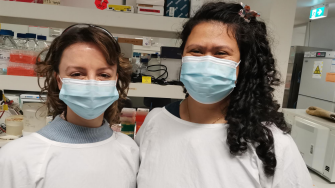
The Molecular Oncology Research Group aims to improve ovarian cancer risk prediction and prognosis, by using large international consortia that are adequately powered to have an impact for patients.
Our goals
Development of clinical tests to improve treatment for ovarian cancer patients
As part of two NHMRC funded grants, we are developing molecular tests on ovarian tumour samples to improve treatment for women diagnosed with ovarian cancer. These tests will determine if a woman should have surgery or chemotherapy first, how they will respond to the current treatment and predict their response to new treatments. These studies are performed through the Ovarian Tumour Tissue Analysis (OTTA) Consortium. Predicting how well a woman may respond to the current treatment may identify a group of women who should be included in clinical trials of new treatments. Together with our team of consumers and clinical colleagues, we are determining how women with ovarian cancer feel about the potential new test in a patient acceptability study.
Improving risk prediction for ovarian cancer
We aim to identify the changes that will help clinicians recognise women at increased risk of ovarian cancer before they develop the disease by studying inherited changes in their DNA. We’re identifying two types of changes. Firstly, large numbers of common variants, each with a very small increased risk. These variants can be combined into a polygenic risk score. Secondly, rare variants with a high or moderate risk of ovarian cancer. Identification of these variants have implications for the treatment of the patient and risk for other family members. These studies are performed through The Ovarian Cancer Association Consortium (OCAC) and Consortium of Investigators of Modifiers of BRCA1/2 (CIMBA).
Research strengths
- Co-leading the Ovarian Tumour Tissue Analysis (OTTA) Consortium
- Steering committee of the Ovarian Cancer Association Consortium (OCAC)
- Consumer engagement
- Large scale genomic analysis of formalin fixed paraffin embedded (FFPE) tumours using the latest technologies, such as NanoString RNA expression, somatic mutations using TamSeq and DNA copy number using shallow whole genome sequencing (sWGS)
- Identification of prognostic markers and signatures
- Validation of prognostic markers by immunohistochemistry (IHC) on tissue microarrays (TMA)
- Germline whole exome sequencing (WES) and large-scale validation by targeted sequencing in large numbers of cases and controls
- Genome wide association studies (GWAS).
Our results
- Prognostic signature for High grade serous ovarian cancer
- Molecular subtypes of High grade serous ovarian cancer
- CD8+ Tumor-Infiltrating Lymphocytes and ovarian cancer survival
- Hormone-receptor expression and ovarian cancer survival
- Association of p16 expression with prognosis of ovarian cancer
- Clinical and pathological associations of PTEN expression in ovarian cancer
- Identified risk variants are being used in a clinical tool to predict ovarian and breast cancer risk.
- Population-based targeted sequencing of 54 candidate genes identifies PALB2 as a susceptibility gene for high-grade serous ovarian cancer
- Germline mutations in the BRIP1 gene in ovarian cancer
- Germline mutations in the RAD51B, RAD51C, and RAD51D genes in ovarian cancer
- Germline whole exome sequencing and large-scale replication identifies FANCM as a likely high grade serous ovarian cancer susceptibility gene
- Identification of 12 new susceptibility loci for different histotypes of epithelial ovarian cancer
Our experts
PhD students
- Ashley Weir
- Lydia Lamb
- Christine McCaffrey
Our collaborators
- The Ovarian Tumor Tissue Analysis consortium
- The Ovarian Cancer Association Consortium
- The Consortium of Investigators of Modifiers of BRCA1/2 (CIMBA)
Related links
- UNSW tops Australian universities with $61m in NHMRC Investigator Grants
- NHMRC funding supports diabetes and ovarian cancer clinical trials
- Tumour gene test could help to predict ovarian cancer prognosis
- New test paves the way for tailored treatment of deadliest form of ovarian cancer
- UNSW Professor Susan Ramus talks to @RNBreakfast about new research on ovarian cancer survival
- More accurate diagnosis for rare ovarian cancer type on the cards, new research reveals
- International study identifies new genetic causes of ovarian cancer
- Ovarian tumour research among studies supported by NSW Health
- Immune response to ovarian cancer may predict survival



